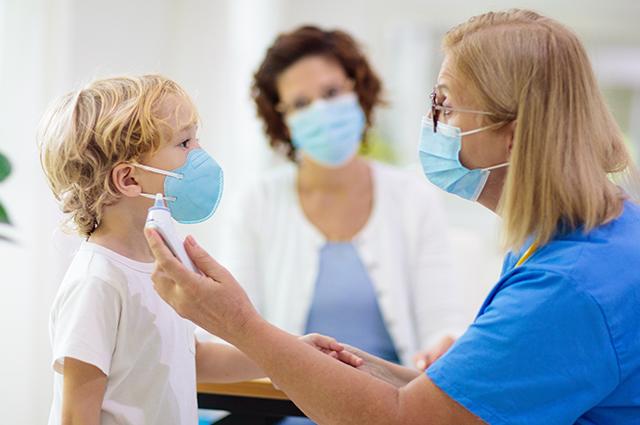-
About
-
Academics
- Physician Assistant
- Special Master’s (MBS)
-
Admissions & Financial Aid
- Tuition & Fees
-
Student Life
-
Research
- Research Labs & Centers
-
Local & Global Engagement
- Global Health Program
Unsure About Taking Your Child to the Physician or Dentist? Don’t Be, Providers Say
Even during a pandemic, checkups, vaccines, and cleanings are as important as ever

With two masks, a face shield, and other layers of personal protective equipment, pediatric dentist Hubert Park says he looks like Buzz Lightyear, the spaceman character from the Toy Story movies. That could be one reason most of his young patients aren’t too taken aback by his new look, or the other changes that the COVID-19 pandemic has necessitated at his Lynn, Massachusetts, practice.
“They don’t find it scary, or foreign, or weird,” says Park, D11, DG14, MPH 14, because kids have become accustomed to masks, PPE, plexiglass barriers, and social distancing. “Kids have really taken things in stride,” adds Cheen Loo, professor and chair of the department of pediatric dentistry at Tufts School of Dental Medicine. As children’s dentists and doctors have had to adapt their offices and protocols because of the coronavirus, they’ve been mindful of the effect this shift in a once-familiar environment might have on youngsters.
But one of their most important messages is directed toward parents: Don’t skip routine well-child visits, vaccinations, cleanings, or checkups because of the pandemic. Both the American Academy of Pediatrics (AAP) and the American Academy of Pediatric Dentistry (AAPD) recommend continuation of preventive visits.
“The thing is to not be afraid; do not delay treatments,” says Meghan Tramontozzi, M07, a family practice physician. “We will make the experience as safe as possible, but it’s important for kids to be seen, even for routine physicals.”
With the unique stress of the pandemic, keeping an eye out for delayed developmental milestones, behavioral issues, or signs of anxiety and depression in children is particularly important.
“Since the onset of the pandemic, a significant drop in well-child visits has resulted in delays in vaccinations, delays in appropriate screenings and referrals, and delays in anticipatory guidance to assure optimal health,” the AAP said in a statement. Among the concerns is that putting off vaccinations may result in secondary outbreaks of preventable illnesses.
“We definitely don’t want vaccinations delayed, and flu shots are very important, especially this year,” says Tramontozzi, who has been offering drive-through vaccinations and seeing patients in a tent in the parking lot of her Middleton, Massachusetts, practice if parents aren’t comfortable bringing their children inside. As it gets colder, she and her partners are considering adding heaters or an outdoor bathroom. “We’re trying to be creative to make everything safe,” she says.
With the use of telemedicine and teledentistry, sometimes an office visit can be avoided. But some things, like vaccinating, or treating a dental abscess, can only be done in person. “We do not want to wait to see our patients until a problem develops and they have to come in for an emergency visit,” says Loo.
If your child has special needs that make the new protocols a concern, reach out to the doctor beforehand. For dental procedures, for example, some treatments can be done under general anesthesia at a hospital, if medically appropriate.
Suspect your child may be a little unsettled with the changes at the pediatrician or dentist’s office? Here are some tips for talking to your child beforehand:
Explain that the doctor will look different. You might say, “He or she may be wearing a mask, but it’s just the same as you wearing your mask. It’s still the same person that you know.”
Go over the new procedure. That could mean waiting in the car instead of the waiting room, expecting no toys if there is a waiting room, getting your temperature checked, and using hand sanitizer.
Let your child know that only one parent or caretaker will likely be allowed in the exam room. Older children should be prepared to go in by themselves.
And one more note about keeping kids healthy right now: “We all like snacks and comfort foods these days,” says Loo, but it’s time to turn attention back to good food choices—and don’t forget the brushing and flossing.